20175301 20175305 20175318 实验四 外设驱动程序设计
实验内容和要求
外设驱动程序设计-1
学习资源中全课中的“hqyj.嵌入式Linux应用程序开发标准教程.pdf”中的第十一章 提交康奈尔笔记的照片(可以多张)
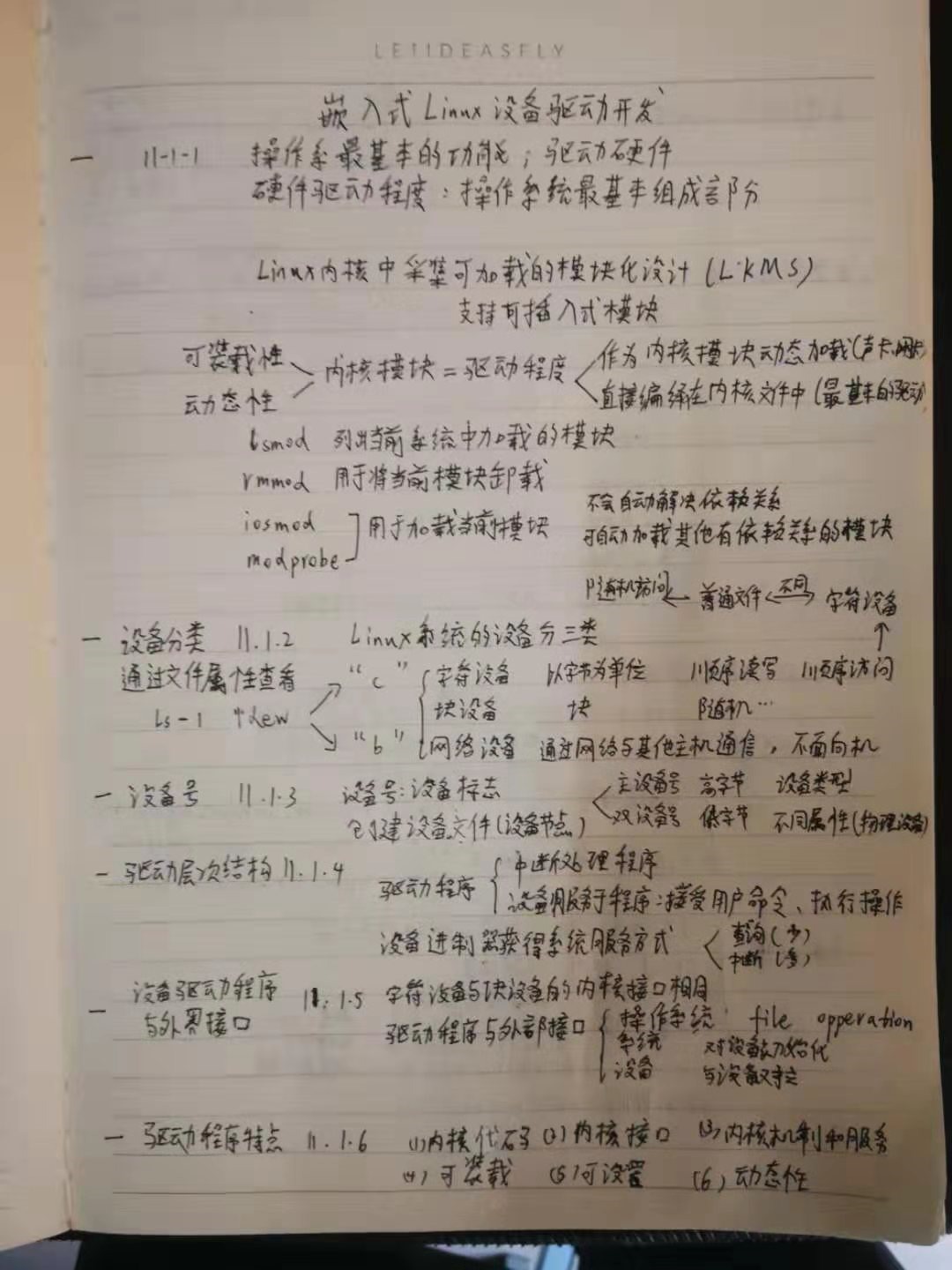
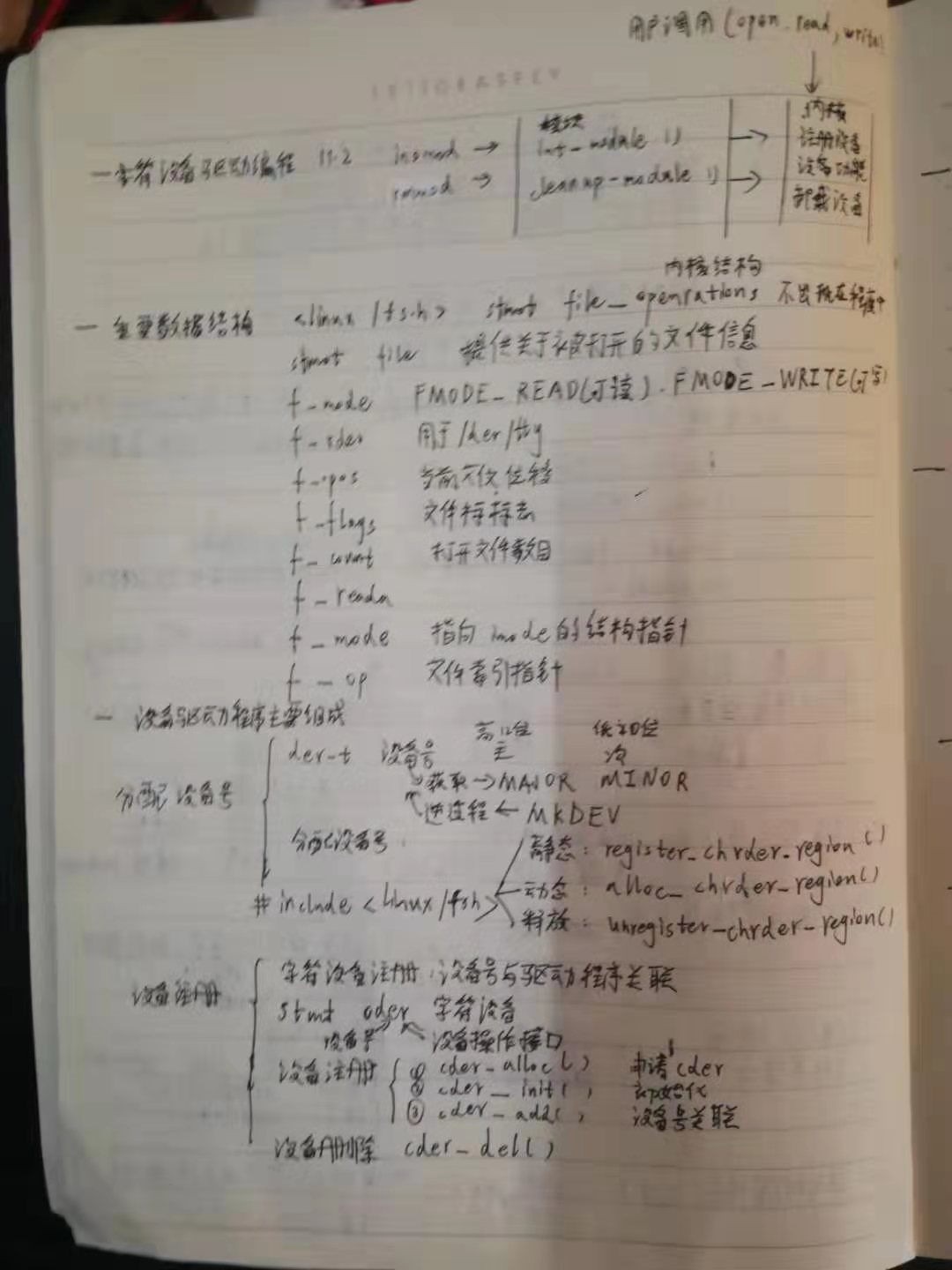
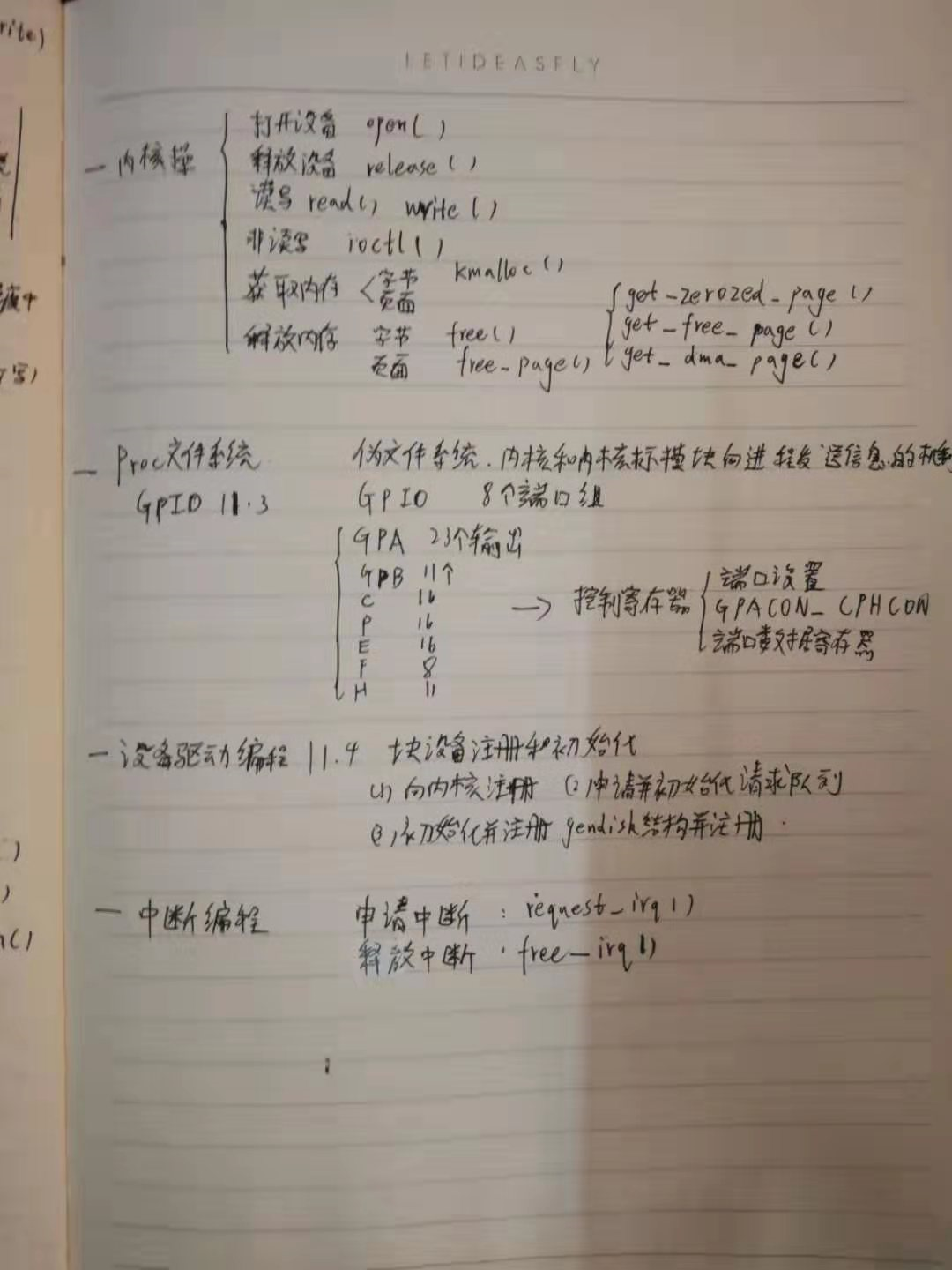
外设驱动程序设计-2
在Ubuntu完成资源中全课中的“hqyj.嵌入式Linux应用程序开发标准教程.pdf”中的第十一章的test试验 提交编译,加载模块,卸载模块,测试运行的截图(要多张,全屏,体现学号信息)
test_drv.c代码如下所示:
/* test_drv.c */ #include <linux/module.h> #include <linux/init.h> #include <linux/fs.h> #include <linux/kernel.h> #include <linux/slab.h> #include <linux/types.h> #include <linux/errno.h> #include <linux/cdev.h> #include <asm/uaccess.h> #define TEST_DEVICE_NAME "test_dev" #define BUFF_SZ 1024 static struct cdev test_dev; unsigned int major =0; static char *data = NULL; /*º¯ÊýÉùÃ÷*/ static ssize_t test_read(struct file *file, char *buf, size_t count, loff_t *f_pos); static ssize_t test_write(struct file *file,const char *buffer, size_t count,loff_t *f_pos); static int test_open(struct inode *inode, struct file *file); static int test_release(struct inode *inode,struct file *file); static ssize_t test_read(struct file *file, char *buf, size_t count, loff_t *f_pos) { int len; if (count < 0 ) { return -EINVAL; } len = strlen(data); count = (len > count)?count:len; if (copy_to_user(buf, data, count)) { return -EFAULT; } return count; } static ssize_t test_write(struct file *file, const char *buffer, size_t count, loff_t *f_pos) { if(count < 0) { return -EINVAL; } memset(data, 0, BUFF_SZ); count = (BUFF_SZ > count)?count:BUFF_SZ; if (copy_from_user(data, buffer, count)) { return -EFAULT; } return count; } static int test_open(struct inode *inode, struct file *file) { printk("This is open operation "); data = (char*)kmalloc(sizeof(char) * BUFF_SZ, GFP_KERNEL); if (!data) { return -ENOMEM; } memset(data, 0, BUFF_SZ); return 0; } static int test_release(struct inode *inode,struct file *file) { printk("This is release operation "); if (data) { kfree(data); data = NULL; } return 0; } static void test_setup_cdev(struct cdev *dev, int minor, struct file_operations *fops) { int err, devno = MKDEV(major, minor); cdev_init(dev, fops); dev->owner = THIS_MODULE; dev->ops = fops; err = cdev_add (dev, devno, 1); if (err) { printk (KERN_NOTICE "Error %d adding test %d", err, minor); } } static struct file_operations test_fops = { .owner = THIS_MODULE, .read = test_read, .write = test_write, .open = test_open, .release = test_release, }; int init_module(void) { int result; dev_t dev = MKDEV(major, 0); if (major) { result = register_chrdev_region(dev, 1, TEST_DEVICE_NAME); } else { result = alloc_chrdev_region(&dev, 0, 1, TEST_DEVICE_NAME); major = MAJOR(dev); } if (result < 0) { printk(KERN_WARNING "Test device: unable to get major %d ", major); return result; } test_setup_cdev(&test_dev, 0, &test_fops); printk("The major of the test device is %d ", major); return 0; } void cleanup_module(void) { cdev_del(&test_dev); unregister_chrdev_region(MKDEV(major, 0), 1); printk("Test device uninstalled "); }
test.c代码如下:
/* test.c */ #include <stdio.h> #include <stdlib.h> #include <string.h> #include <sys/stat.h> #include <sys/types.h> #include <unistd.h> #include <fcntl.h> #define TEST_DEVICE_FILENAME "/dev/test_dev" #define BUFF_SZ 1024 int main() { int fd, nwrite, nread; char buff[BUFF_SZ]; fd = open(TEST_DEVICE_FILENAME, O_RDWR); if (fd < 0) { perror("open"); exit(1); } do { printf("Input some words to kernel(enter 'quit' to exit):"); memset(buff, 0, BUFF_SZ); if (fgets(buff, BUFF_SZ, stdin) == NULL) { perror("fgets"); break; } buff[strlen(buff) - 1] = '�'; if (write(fd, buff, strlen(buff)) < 0) { perror("write"); break; } if (read(fd, buff, BUFF_SZ) < 0) { perror("read"); break; } else { printf("The read string is from kernel:%s ", buff); } } while(strncmp(buff, "quit", 4)); close(fd); exit(0); }
Makefile内容如下:
ifeq ($(KERNELRELEASE),) KERNELDIR ?= /lib/modules/$(shell uname -r)/build PWD := $(shell pwd) modules: $(MAKE) -C $(KERNELDIR) M=$(PWD) modules modules_install: $(MAKE) -C $(KERNELDIR) M=$(PWD) modules_install clean: rm -rf *.o *~ core .depend .*.cmd *.ko *.mod.c .tmp_versions .PHONY: modules_install clean else obj-m := test_drv.o endif
test_drv_load脚本内容如下:
#!/bin/sh module="test_drv" device="test_dev" mode="664" group="david" # remove stale nodes rm -f /dev/${device} # invoke insmod with all arguments we got # and use a pathname, as newer modutils don't look in . by default /sbin/insmod -f ./$module.ko $* || exit 1 major=`cat /proc/devices | awk "\$2=="$device" {print \$1}"` mknod /dev/${device} c $major 0 # give appropriate group/permissions chgrp $group /dev/${device} chmod $mode /dev/${device}
test_drv_unload脚本内容如下:
#!/bin/sh module="test_drv" device="test_dev" # invoke rmmod with all arguments we got /sbin/rmmod $module $* || exit 1 # remove nodes rm -rf /dev/${device} exit 0
加载模块
- 先给脚本文件增加可执行权限:chmod +x ./test_drv_load
- 再以管理员身份运行加载脚本:sudo ./test_drv_load
- 加载成功
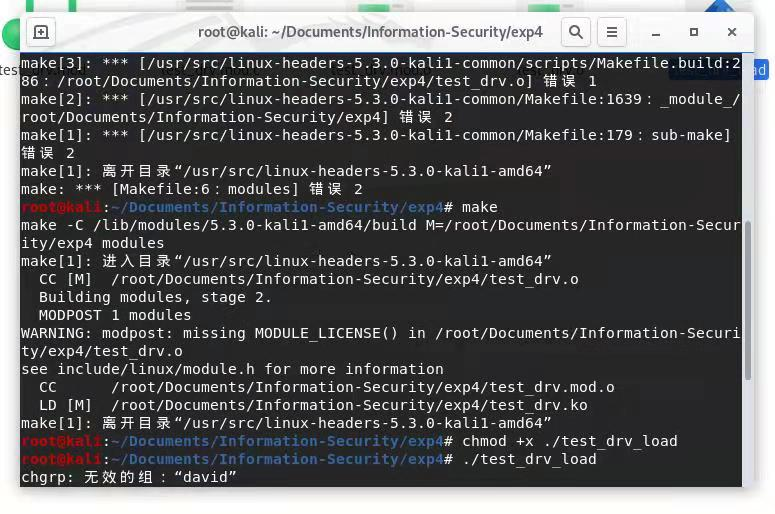

-
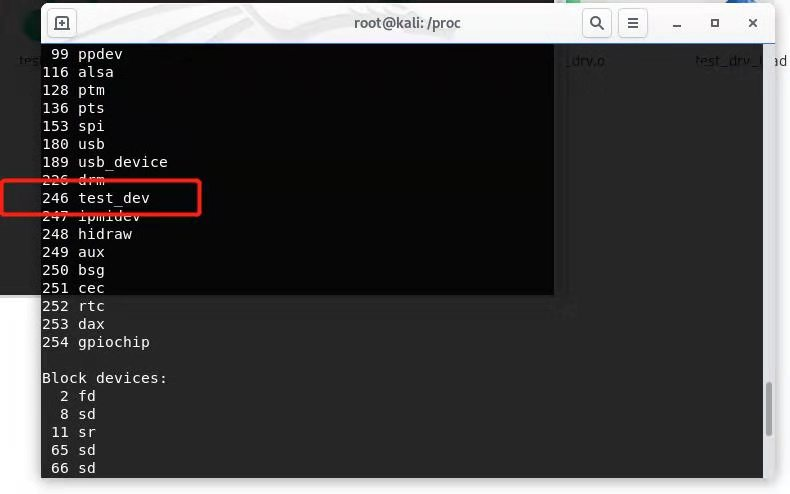
-
编译运行test.c
- 编译:gcc -o test test.c
- 运行:./test
- 根据提示输入学号信息
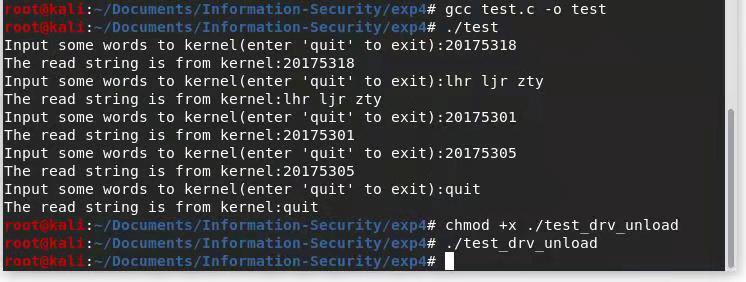
遇到的问题及解决
1、使用make命令编译代码时报错:Makefile ...(行号) ... 遗漏分隔符...停止
命令行前缺少Tab
反斜线后多了空格
配置文件vimrc中有set expandtab(使用空格代替制表符)
2、运行脚本时提示无效的组david
cat /etc/passwd查看所有的用户信息
cat /etc/group查看所有组信息
将脚本中的组名改成系统中有的组名即可
3、运行脚本时提示insmod: error inserting '***.ko': -1 File exists
可能是你以前同名的驱动没有卸载干净。
解决方法:用lsmod | grep 查看是否已经存在该模块,如果存在,则sudo rmmod ,卸载干净。然后重新insmod即可。
参考链接
https://www.cnblogs.com/Windeal/archive/2013/06/07/4284691.html
https://blog.csdn.net/yfcheng_yzc/article/details/29609229